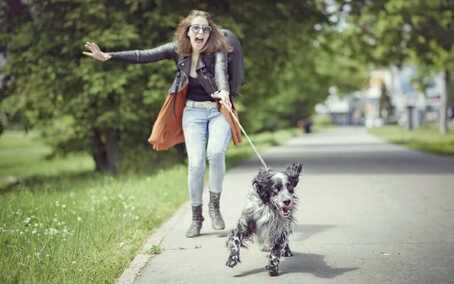|
Having a ‘teenager’ is tough. I don’t care how many dogs you’ve had or how much time you put into your puppy training and socialisation skills – everyone (yes me too) has challenges to deal with during adolescence. If you can accept that, then the journey is going to be so much more enjoyable.
Why do we beat ourselves up with the ‘I should have done’ or ‘why didn’t I do that’ or ‘I should have spent more time’ etc etc. The guilt we put upon ourselves just doesn’t help and in fact probably stops progress. We send so much time focusing on the ‘what if’s’ that we don’t focus on working through the problem. Anywhere from 5 months up your dog will go through their adolescence period. This could mean challenges such as: being destructive, hyperarousal, reactivity (barking/lunging), prey drive, guarding, forgetting even the simplest cues and becoming the over the top, over social dog that must go and see every dog and person in the park! Does that sound familiar? Do you remember going through your teenage years? Everything is changing. Body, brain, hormones are raging, and nothing makes sense. It’s time to explore the world but then fear kicks in and it’s too overwhelming. Do you remember? It’s tough. It takes time. It takes patience. This is the time that you will definitely question whether getting a dog was a smart choice. It all just feels too hard. I am here to tell you it’s all normal. It’s all ok. This is a phase that I really want to give you permission to have days where you just except that your dog doesn’t know what sit means and their manners have totally disappeared. To give yourself a day off to not focus on the really long list of skills your dog still needs to learn. Stop, look, enjoy the now larger fluff ball that you are sharing your life with. Understand that not everyday needs to be a school day. Find out what they love to do and get involved. Focus on managing their environment so that they cannot rehearse the behaviour you don’t want them to do. Dr Susan Friedman said “control the environment not the animal”. I love this because we can control the environment with planning. One of my go to sayings is “don’t set your dog up to fail”. If you know it might go wrong, why are you doing it? Traditional punishment training mindset tells us that we must focus on controlling the individual, but actually we need to focus on the conditions where the behaviour occurs. We can help our dogs learn by making the behaviours we want from them easy to achieve and therefore reward them for those choices. Thus making that ‘good’ behaviour choice more likely next time. The good – it does get better The bad – it’s going to take time and patience and a good sense of humour to survive The Ugly – every dog will have their own challenges (but they can all be worked through) I hope that has given you at least a little peace of mind today. If you do want any support, please get in touch. Jo x
0 Comments
Leave a Reply. |
Archives
June 2024
|
|
© COPYRIGHT Paws4teaching 2023
Terms and conditions |




